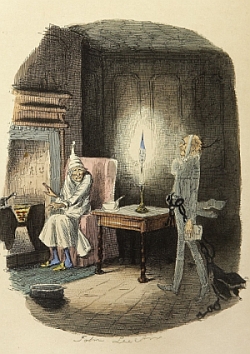 Scrooge cowered on his knees. The visits of the first two ghosts shook him to the core of his miserly being. He knew the Ghost of Christmas Future was next. Scrooge, after all, had been reading Malthus.
Scrooge cowered on his knees. The visits of the first two ghosts shook him to the core of his miserly being. He knew the Ghost of Christmas Future was next. Scrooge, after all, had been reading Malthus.
An unmistakable thud of a piano chord — probably an E major, with reverb set on foreboding — sliced through the chilly air of Scrooge’s dark quarters. Scrooge winced. He opened his eyes slowly, expecting to see a tall, ominous, black robed figure, most likely armed with a scythe, or at the very least a sickle. Instead, he saw a rather diminutive man wearing wire-rimmed glasses and holding a palm-sized device in his hand.
“Hi. My name is Ray Kurz…”
He suddenly stopped his introduction.
“Oh, wait. That’s not the line. Let me try again.” the spirit cleared his throat. “I am the Ghost of Christmas Fuuuuuture,” he spoke in a mildly mocking baritone.
“My future?” Scrooge asked.
“Well, in the future, it’s really hard to delineate between the personal and the collective in an exponential destiny.”
Scrooge furled his brow.
“What? Anyway. Ghost of Christmas Future. It is you who I fear most of all.”
“Why? The future’s not so bad. In fact, we’ve solved a lot of problems.”
“Wait. Aren’t you going to lecture me on how my covetousness has impoverished society and instill fear in me about how my skinflint ways have robbed me of a meaningful existence?”
The Ghost of Christmas Future chuckled, “Not at all. I mean, there’s no need for greed in the future. The scarcity society has totally been replaced. Check it out.”
Instantly, Scrooge and the spirit were transported to the streets that once crisscrossed Scrooge’s bleak, sketchy neighborhood. Instead, the streets were clean.
“That’s called quantum teleportation,” the spirit whispered in Scrooge’s ear. “Not a bad little parlor trick, huh?”
Autonomous vehicles zipped along London’s streets with passengers laughing and checking out video messages on their “portable cyphering blackboards,” as Scrooge dubbed them. Other folks strolled through the streets. They looked healthy, well-dressed and well-fed.
“You see, Scrooge, with molecular manufacturing, people have access to the best clothes and best products, quickly and cheaply. You can even make food! The new economy is one based on abundance, not lack.”
As if to prove his point, the spirit snapped his finger and the two were suddenly facing a stately mansion.
“Is this mine?”
“No. No. This is the home of Bob Cratchit.”
“My penniless bookkeeper.”
“Not penniless anymore. And not a bookkeeper. In fact, once automation forced most manual bookkeepers out of work, Cratchit created a social network for former workers to crowdsource for new job opportunities. It IPOed a few years ago. I think the market cap is, like, $6 billion.”
Scrooge saw Bob Cratchit’s wife in the window. She stood next to a three-dimensional replication machine, printing out mittens for her extended brood. Just then, a young boy sprinted by. Even though Scrooge and the spirit could not be perceived by the young man, the suddenness of the approach shocked the miser.
“And who was that hooligan?” Scrooge wondered.
“That was Cratchit’s youngest, Tiny Tim.”
“But it couldn’t be. Tiny Tim is a cripple.”
“OK. So, first off, we don’t say ‘cripple’ in the future. It’s better to say, ‘handicapped.’ Or, even better, ‘artificially enhanced’ You see, Tiny Tim was able to regenerate a new leg.”
 With another snap of the spirit’s fingers, Scrooge and the ghost landed in a grassy field. A few brown leaves rattled along the ground, being pushed by a howling wind. Tombstones and monuments flanked the two lone souls.
With another snap of the spirit’s fingers, Scrooge and the ghost landed in a grassy field. A few brown leaves rattled along the ground, being pushed by a howling wind. Tombstones and monuments flanked the two lone souls.
The Ghost of Christmas Future pointed firmly at a tombstone at the edge of the cemetery.
“Oh, no, spirit. Say it isn’t so.”
The spirit pointed even more forcefully. Scrooge kneeled and then crawled toward the tall, dark tablet. He strained his eyes to read the inscription. It wasn’t an inscription at all. It was a sign. “Coming Soon. Longevity Institute. Research Center for Extending Human Life Indefinitely.” Scrooge rubbed his eyes and looked again.
“No death anymore, Scrooge, my good man. You’ve got an infinite time to make amends for your rather spotty past. Decrease the surplus population, indeed.”
Scrooge woke the next morning, excited with the prospects of an exponentially growing, prosperous, healthy future. He never worried about scrimping a few quids, but instead invested heavily in the biotech and quantum computation field. He vowed to become as good a friend, as good a master, and as good a transhuman, as the good old city knew.
About the Author:
Matt Swayne is a blogger and science writer. He is particularly interested in quantum computing and the development of businesses around new technologies. He writes at Quantum Quant.



